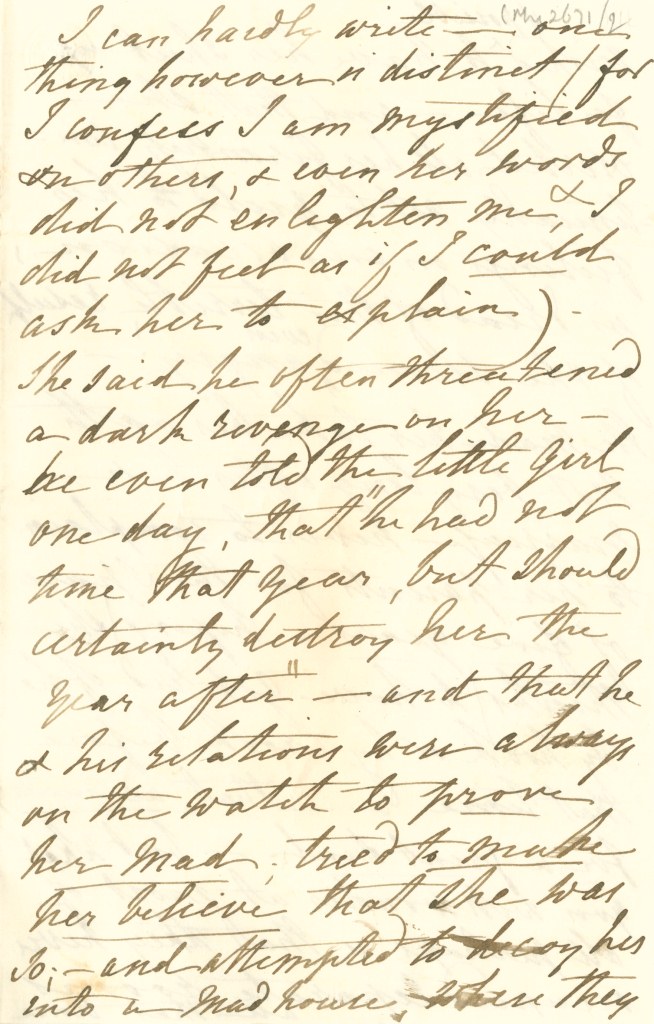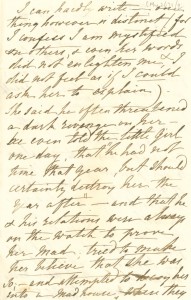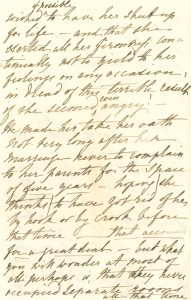
October 16, 2014, by Sarah Colborne
Effie, Lady Eastlake, and the evidence in the archives
Last night some of the staff from Manuscripts and Special Collections went to see the film ‘Effie Gray’, in order to compare the evidence in the archives held at the University of Nottingham with the latest interpretation of the scandal that was the annulment of the marriage of Euphemia Gray and art critic John Ruskin, and her subsequent marriage to Ruskin’s close friend and disciple, the painter John Everett Millais. This latest version is based on a screenplay by Emma Thompson, who also plays Lady Elizabeth Eastlake (1809-1893, art critic and friend to Effie).
Effie married John Ruskin in 1848 at the age of twenty (he was also in his twenties, though the film suggests he was much older). In a previous blog, we looked at the friendship between Effie and Brinsley Marlay (1829-1912), whose papers are held here at Nottingham. Although most from this time are said to have been destroyed, the collection includes two letters written by Effie to Marlay while she was in Scotland (where she fell in love with Millais). In one letter dated 27 July (My 2618), she describes the sleeping arrangements at the cottage where they stayed while Millais painted a portrait of Ruskin, which supports the portrayal of the episode in the film, though poor Crawley has been omitted:
“We are here in a very nice cottage where Mr Ruskin sleeps on the floor, Mr Millais in a place where he can open the door, pull flowers from the Hill and do every thing without the trouble of leaving his bed, I have another such hole, and our servant Crawley who passes his time in trying to catch Trout suspending himself from the rocks in true Cockney style with attitudes so unlike a Highlander that it is impossible not to laugh”.
In April 1854 she started proceedings to have the marriage annulled and Ruskin confirmed to the court that the marriage was never consummated, claiming that he was in some way repulsed by her. The extent to which the scandal was discussed at the time is revealed in private letters of the period, including letters held at Nottingham (Portland Collection Pw M 226-8, 25 May – 21 July 1854) between Lady Eastlake and Italian historian Rawdon Brown (1803-1883). The friends, writing during the annulment proceedings, express sympathy for Effie (Eastlake refers to her as “our little friend”) and they condemn the Philobiblion Society for spreading rumours: “…a society who profess to talk of old books, but really meet only to gossip…”. Millais is not explicitly mentioned, although Brown hints at his involvement (Pw M 228):
“…once the Ecclesiastical Court has pronounced sentence, no time need be lost in letting the world know most distinctly that she does not affect any intention of remaining single.”
Brinsley’s mother, Catherine Louisa Marlay (1831-1854) is bursting with excitement when she reports in a letter to her son, dated 16 Sep. 1855 (My 2671) that on a recent visit to see Mr and Mrs Gray (Effie’s parents), she took the opportunity to ride in a carriage with Effie (recently married to Millais) and quiz her about the details of her marriage to Ruskin. Effie confides that Ruskin threatened a dark revenge, that “…he and his relations were always on the watch to prove her mad…”, and Mrs Marlay marvels that in all the time they were married, they never occupied separate rooms (the film shows them actually sharing a bed).
The sober response of her son, Brinsley (My 2151), may represent the opinion of many at the time, stating: “Any additional fact you bring regarding Mr Ruskin’s cruelty does not in anywise alter my view of the matter” – Effie has damaged her reputation by starting a relationship with Millais so soon after her separation from her husband.
As far as we’re aware, researchers for the film didn’t take into account the evidence in the archives at Nottingham.The film portrays the neglect, and some of the cruelty (though not the threat of imprisonment in an asylum which lead to her fear of expressing her emotions), and explains Ruskin’s behaviour as being the result of the upbringing he received at the hands of his ambitious parents. It is a great shame that the film doesn’t go on to show what happened in the ecclesiastical court, the scandal of her remarriage or the damage her reputation suffered as a result. It also only hints at her later happiness (she made up for lost time and went on to have eight children with Millais).
All of the letters are available for anyone to consult in our Reading Room at King’s Meadow Campus. For more information about Manuscripts & Special Collections, visit our website or follow us @mssUniNott.
No comments yet, fill out a comment to be the first



Leave a Reply